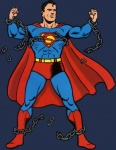
DC Comics won a round last week in its litigation with Marc Toberoff , attorney for the Siegel and Shuster heirs in their pursuit to regain Superman rights: a magistrate ruled that documents stolen from Toberoff’s office by a former attorney could be given to DC, according to Variety. The documents were stolen, given to Warners, then returned during an investigation by the U.S. Attorneys office. Now the judge ruling in the case says that because Toberoff voluntarily gave the documents to a grand jury investigating the theft, they should be made available to DC. Toberoff argues that the feds had agreed to keep the documents confidential.
A district court judge is being asked to rule on the situation before the magistrate’s ruling is put into effect.
DC wants the docs to reinforce the points it’s making in its lawsuit against Toberoff (see “Siegel, Shuster Attorney Responds”). That suit is a sideshow to the main event, the litigation between DC and the Siegel and Shuster heirs over the Superman rights. As things currently stand in that litigation, rights to the early works in which Superman was introduced will revert to the Siegel and Shuster estates.
One possible outcome is that in the future there could be two versions of the Superman mythos, one based on the early years of comics and owned by the Siegel and Shuster heirs, and another based on the character as later changed and developed by DC. The possibility was raised in an article by Anthony Cheng in the Columbia Journal of the Law & the Arts, and reported by Variety.
The rationale for the coexistence of two versions of the character comes from an appellate ruling in the lawsuit by Neil Gaiman against Todd McFarlane (see “Gaiman Sweep”), in which it was determined that Medieval Spawn, created by Gaiman, was sufficiently different from the original Spawn to justify a separate character copyright.
Of course, splitting the character is unlikely to be something that either side in the dispute wants. But with the two sides at odds in a very personal way (see “DC, Warners Shamed”), it’s not clear that the parties could agree to work together.







